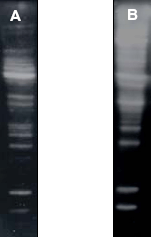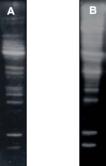Modification of proteins by addition of K63-linked polyubiquitin chains is implicated in a variety of cellular events, including DNA repair, signal transduction and receptor endocytosis.
A monoclonal antibody (mAb) has been generated that specifically recognizes K63-linked polyubiquitin chains, but not any other isopeptide-linked (K6, K11, K27, K29, K33, or K48) polyubiquitin chain or monoubiquitin. The specificity of this K63-linked ubiquitinspecific monoclonal antibody was demonstrated using synthetic ubiquitin chains, single isopeptide-linked polyubiquitin chains, and with endogenously ubiquitinylated species in both cell lysates and intact cells.
The hybridoma secreting the antibody [clone HWA4C4] was generated by fusion of splenocytes from Balb/c mice which had received repeated immunisation with a synthetic peptide encompassing the ubiquitin K63-isopeptide motif. Immunoglobulin was purified from tissue culture supernatant by ion exchange chromatography.
Product Details
| Clone: | HWA4C4 |
| |
| Host: | Mouse |
| |
| Isotype: | IgG2a |
| |
| Immunogen: | Synthetic peptide containing the ubiquitin K63-isopeptide motif. |
| |
| UniProt ID: | P0CG47 (UBB), P0CG48 (UBC) |
| |
| Source: | Purified from hybridoma tissue culture supernatant. |
| |
| Species reactivity: | Species independent
|
| |
| Specificity: | Recognizes K63-linked polyubiquitin in wide range of species. |
| |
| Crossreactivity: | Does not cross-react with any other isopeptide-linked (K6, K11, K27, K29, K33, or K48) polyubiquitinylated species. |
| |
| Applications: | ELISA, ICC, IHC, WB
|
| |
| Recommended Dilutions/Conditions: | Immunocytochemistry (1:100)
Immunohistochemistry (1:100)
Western Blot (1:500 - 1:1,000)
Specificity for K63 of mAb to Polyubiquitin (K63-linkage-specific) (HWA4C4) is temperature sensitive. Western blot membranes must not be autoclaved. Excessive heat should be avoided in all applications. K63-linked polyubiquitin modified proteins comprise only a proportion of total cellular polyubiquitinylated species. Increased sample loading may therefore be required for analysis by Western blot. Do not use milk as blocking solution. Use 1% BSA in an appropriate buffer instead.
Suggested dilutions/conditions may not be available for all applications.
Optimal conditions must be determined individually for each application. |
| |
| Formulation: | Liquid. In PBS containing 0.09% sodium azide. |
| |
| Handling: | Avoid freeze/thaw cycles. After opening, prepare aliquots and store at -20°C. |
| |
| Shipping: | Blue Ice |
| |
| Long Term Storage: | -20°C |
| |
| Regulatory Status: | RUO - Research Use Only |
| |

Figure 1: Western blot of single isopeptide-linkage polyubiquitinylated conjugates K6 (BML-UW0615), K11 (BML-UW0620), K27 (BML-UW0625), K29 (BML-UW0630), K33 (BML-UW0635), K48 (BML-UW0640), K63 (BML-UW0645),1µg each, using MAb to Polyubiquitinylated Conjugates (FK1) (BML-PW8805) and MAb to Polyubiquitin (K63-linkage-specific) (HWA4C4) (BML-PW0600) at 1:1’000 dilution.

Figure 2: Western blot of HeLa S100 Fraction (BML-SW8750, 5µg) probed with MAb to Polyubiquitin (K63-linkage-specific) (HWA4C4) (BML-PW0600) (Lane A) and MAb to Polyubiquitinylated Conjugates (FK1) (BML-PW8805) (Lane B) at 1:1’000 dilution.

Figure 3: Formalin-fixed paraffin-embedded sections of hippocampus from human Alzheimer’s disease brain stained with MAb to Polyubiquitin (K63-linkage-specific) (HWA4C4) at 1:100 dilution with biotinylated secondary antibody and DAB detection.
Please mouse over
Product Literature References
Legionella longbeachae Regulates the Association of Polyubiquitinated Proteins on Bacterial Phagosome with Multiple Deubiquitinases: Y. Shi, et al.; Microbial. Spectr.
11, 04179 (2023),
Abstract;
MLN4924 Inhibits Defective Ribosomal Product Antigen Presentation Independently of Direct NEDDylation of Protein Antigens: K. Vijayasimha, et al.; J. Immunol.
208, 2273 (2022),
Abstract;
N4BP1 negatively regulates NF-κB by binding and inhibiting NEMO oligomerization: H. Shi, et al.; Nat. Commun.
12, 1379 (2021),
Abstract;
BLM Potentiates c-Jun Degradation and Alters Its Function as an Oncogenic Transcription Factor: R. Priyadarshini, et al.; Cell Rep.
24, 947 (2018),
Abstract;
Embryonic lethality in mice lacking Trim59 due to impaired gastrulation development: X. Su, et al.; Cell Death Dis.
9, 302 (2018),
Abstract;
Full Text
Salmonella escapes antigen presentation through K63 ubiquitination mediated endosomal proteolysis of MHC II via modulation of endosomal acidification in dendritic cells: M. Gogoi, et al.; Pathog. Dis.
76, ftx1258 (2018),
Abstract;
Full Text
The E3 ubiquitin ligase Pellino2 mediates priming of the NLRP3 inflammasome: F. Humphries, et al.; Nat. Commun.
9, 1560 (2018),
Abstract;
Full Text
ZUFSP Deubiquitylates K63-Linked Polyubiquitin Chains to Promote Genome Stability: P. Haahr, et al.; Mol. Cell
70, 165 (2018),
Abstract;
A microchip platform for structural oncology applications: C.E. Winton, et al.; NPJ Breast Cancer
2, 16016 (2016),
Abstract;
Full Text
Formaldehyde Is a Potent Proteotoxic Stressor Causing Rapid Heat Shock Transcription Factor 1 Activation and Lys48-Linked Polyubiquitination of Proteins: S. Ortega-Atienza, et al.; Am. J. Pathol.
186, 2857 (2016),
Abstract;
Full Text
CYLD and the NEMO zinc finger regulate tumor necrosis factor signaling and early embryogenesis: Y. Zhao, et al.; J. Biol. Chem.
290, 22076 (2015),
Application(s): Western blot ,
Abstract;
Full Text
Cytosolic PTEN-INDUCED PUTATIVE KINASE 1 is Stabilized By NF-κB Pathway and Promotes Non-Selective Mitophagy: G.G. Lim, et al.; J. Biol. Chem.
290, 16882 (2015),
Abstract;
Full Text
Pale body-like inclusion formation and neurodegeneration following depletion of 26S proteasomes in mouse brain neurones are independent of α-synuclein: S.M. Paine, et al.; PLoS One
8, e54711 (2013),
Application(s): Immunohistochemistry of mouse tissue,
Abstract;
Full Text
pVHL Mediates K63-Linked Ubiquitination of nCLU: J. Xue, et al.; PLoS One
7, e35848 (2012),
Abstract;
Full Text
K33-linked polyubiquitination of T cell receptor-zeta regulates proteolysis-independent T cell signaling: H. Huang, et al.; Immunity
33, 60 (2010),
Application(s): Western blot,
Abstract;
Full Text
General Literature References
Analysis of nondegradative protein ubiquitylation with a monoclonal antibody specific for lysine-63-linked polyubiquitin: H. Wang et al.; PNAS
105, 20197 (2008),
Abstract;
Full Text
Proteasome-independent functions of ubiquitin in endocytosis and signaling. : D. Mukhopadhyay & H. Riezman; Science
315, 201 (2007),
Abstract;
Distinct monoubiquitin signals in receptor endocytosis. : K. Haglund et al. ; Trends Biochem.Sci.
28, 598 (2003),
Abstract;
TAK1 is a ubiquitin-dependent kinase of MKK and IKK: C. Wang et al. ; Nature
412, 346 (2001),
Abstract;
Cell cycle-regulated modification of the ribosome by a variant multiubiquitin chain. : J. Spence et al.; Cell
102, 67 (2000),
Abstract;
Noncanonical MMS2-encoded ubiquitin-conjugating enzyme functions in assembly of novel polyubiquitin chains for DNA repair. : R. M. Hofmann et al.; Cell
96, 645 (1999),
Abstract;
A ubiquitin mutant with specific defects in DNA repair and multiubiquitination. : J. Spence et al.; Mol.Cell Biol.
15, 1265 (1995),
Abstract;
Full Text

















